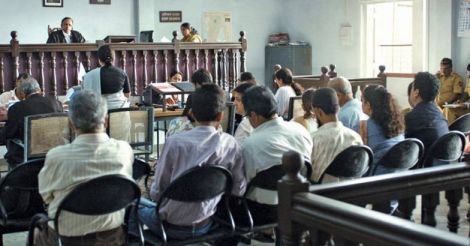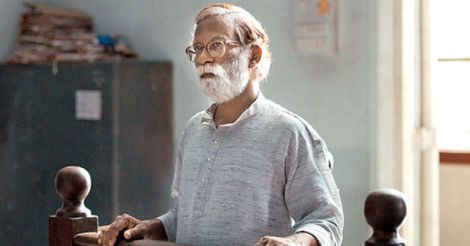Marathi movie Court bagged the National award for the best feature film announced on Tuesday, with accolades pouring in for its director Chaitanya Tamhane.
Director: Chaitanya Tamhane
Country: India
Language: Marathi, Hindi, English & Gujarati
Duration: 116’
 The blend of aesthetics and the realism culminates in a courtroom scene, where everyone quits for the day and the court room is plunged in darkness
The blend of aesthetics and the realism culminates in a courtroom scene, where everyone quits for the day and the court room is plunged in darknessReview of Court
In nutshell it's a realistic take on the society and its inevitably discordant connection with the system of order. The highlight of the movie is the depiction of life and human affairs mainly in the middle class din in their exact hue and colour, yet holding the essence of aesthetics. It is evident throughout.
The indistinct chatterings, gestures, interactions, one-end telephonic conversations, casual talks, movements, the 'business' within the a set of characters, the hobnobs, the horns, the sounds, the soundlessness and so on all perfectly reflect what we descry as we throw open our eyes to the surroundings with an intent to observe. The originality is brought about by magnifying even the vague indistinctiveness of a collective bustle we come across every now and then around us.
It is an insight into the irony of things that human lives are propelled into by the invisible but invincible hands of the smiling monster called society. Chaitanya Tamhane makes use of the top order of the system to uncoil the mismatch of facts and the doctrines laid in the doctrine for the rights and welfare of citizens. It lays bare the truths that the unprivileged is stifled by the machinery which is supposed to shield and save citizens. It would be tad too euphemistic to say Tamhane did it with elan. It's a simple but the best take so far.
Tamhane covers pretty much of the mundane. But it is the court proceedings that expose the incongruences and bring to light the cold procedures in a witty fashion. Ironically, the prosecution counsel makes not a slight error in the language of the paper works.
Narayan Kamble a folk singer who earns a living by giving tuitions is indicted for abetting suicide of sewerage worker. The charge says that one of his folk song performance, which allegedly had contents inciting all those who work in gutters commit suicide. Incidentally, one such worker, commits suicide a couple of days after Kamble’s performance in the locality. Despite evidences which clearly showed that the reason for Sadashiv's death was asphyxiation in an inebriated state while working in a sewerage gutter his chances to win a bail was in question. The reason is his past had elements of anti-social, anti-national and extremist nature. And the arbitration and the hearings go on end.
The blend of aesthetics and the realism culminates in a courtroom scene, where everyone quits for the day and the court room is plunged in darkness after the attendant keeps the last file of the day in a safe and retires after switching off the lights.
It is the dexterity and the artistic craft with which Tamhane weaves together the different aspects of the society with wit, grit and insight stand out for praise. The film is never reduced to a mere holler for a social cause. There are songs, there is humour, there is art but all are etched on the undulating landscape of his narrative. It is the naturalism that is the art in the film - naturalism with exact pace, pulse and rhythm of life.
The only part that jerks you back is where the case, which almost settled at one is seen hurtled back to the mess again and Narain Kamble who is seen recovering at a hospital is suddenly seen at a press where his book is being printed. Whether it's his recollection or or otherwise remain uncler. Also at times the realistic mode is excessively iduced but this never gets closer to a recognisable limit.
Though a story of this kind would invariably invoke a remarkable acting prowess, the acting department deserves a vow. Whether it is the defence counsel (Vivek Gomber), public prosecutor (Geetanjali Kulkarni), Narayan Kamble (Vira Sathidar ) or the judge (Pradeep Joshi). However, to me it was the role of Sharmila Pawar (Usha Bane), widow of sewerage worker, who blew me over. There was not even a blink of eyes that would have undone the character.
Tamhane summed it up with a note that every one is part of the social bandwagon and that even the judge is a human being.
So there is no wonder why Tamhane’s debut film went on to win a number of accolades including New Talent Award at Hong Kong Asian Film Festival, Best Film and Best Director awards at the Asian Feature Film category at the Singapore Film Festival, the Turkish Film Critics’ Association (Siyad) award for the Best Film at 51st International Antalya Golden Orange Film Festival among others.

































































.jpg.image.160.84.jpg)

























































































































































































































































































































































































































































































































































































































































 A still from the movie
A still from the movie
Disclaimer
The comments posted here/below/in the given space are not on behalf of Manorama. The person posting the comment will be in sole ownership of its responsibility. According to the central government's IT rules, obscene or offensive statement made against a person, religion, community or nation is a punishable offense, and legal action would be taken against people who indulge in such activities.